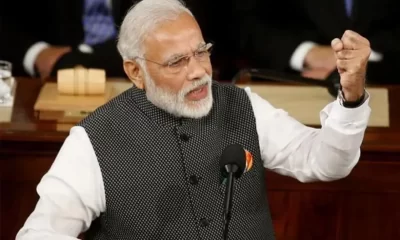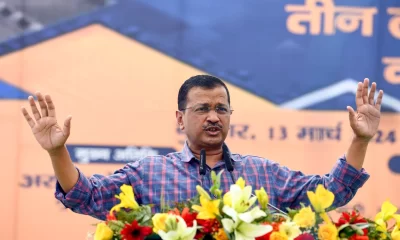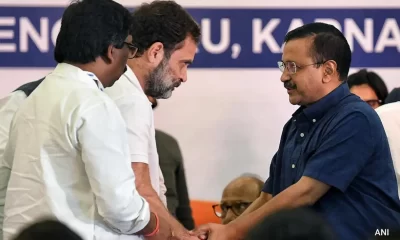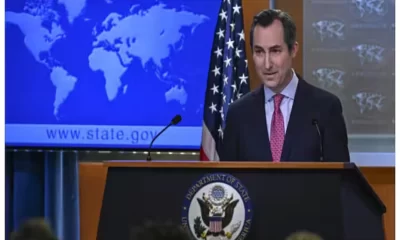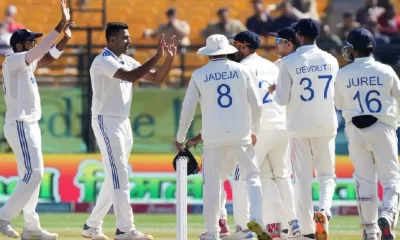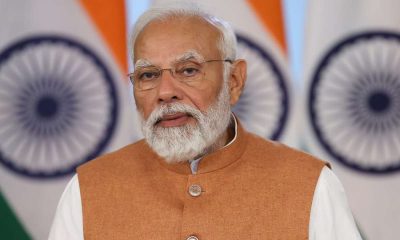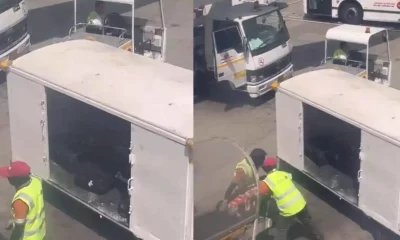Latest world news
US issues travel advisory ahead of Trump’s new ban
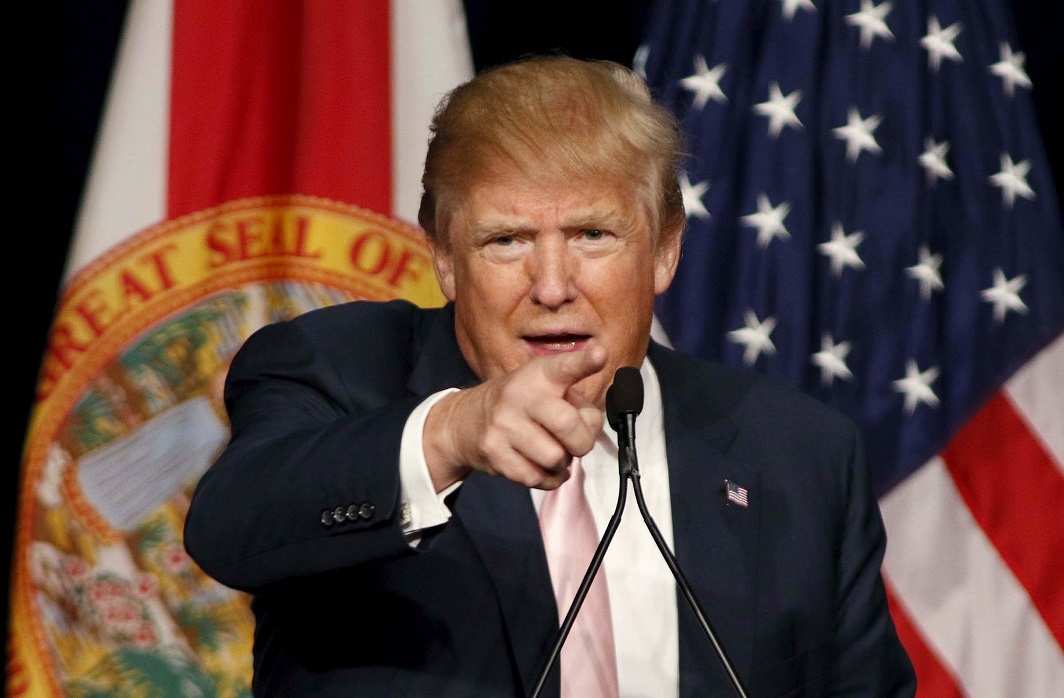
[vc_row][vc_column][vc_column_text]India among countries to be wary of, says a private mailer sent to citizens
By APN Bureau
US embassies across the world have sent out heightened security warnings privately to their citizens who are travelling. American citizens have been warned to stay away from several countries—not just statutory areas such as North Korea and Afghanistan—and terror situations have been pointed out across the globe (including India) from where American citizens might be kidnapped.
While the advisory about India is regarding extremist activity, there is no elaboration.
While the language of the sudden advisory may be almost standard, it did talk about a “Worldwide Caution”, as well as “information on the continuing threat of terrorist actions, political violence, and criminal activity against US citizens.”
Its timing was also critical, coming just ahead of the deadline when US President Donald Trump was to announce his new executive order on travel ban.
APN accessed the mailer sent out by the US embassy in New Delhi and we reproduce some critical portions of the long e-mail.
Worldwide caution updated
The beginning was a giveaway of the seriousness with which the state department was treating this situation. It says: “As part of the Department of State’s continuous efforts to provide U.S. citizens traveling abroad with information about safety and security events, we are updating the Worldwide Caution with information on the continuing threat of terrorist actions, political violence, and criminal activity against US citizens and interests abroad. This replaces the Worldwide Caution dated September 9, 2016.
“As terrorist attacks, political upheaval, and violence often take place without any warning, U.S. citizens are strongly encouraged to maintain a high level of vigilance and take appropriate steps to increase their security awareness when traveling,” the mailer said.
To be in constant touch with its citizens placed and travelling abroad, the mailer insists: “Travelers are urged to enroll in the Smart Traveler Enrollment Program (STEP) to receive security messages and make it easier to locate you in an emergency. The Department uses these security messages to convey information about terrorist threats, security incidents, planned demonstrations, natural disasters, etc. In an emergency, please contact the nearest U.S. Embassy or Consulate or call the following numbers: 1-888-407-4747(toll-free in the United States and Canada) or 1-202-501-4444 from other countries.”
Except for the introduction all sounds pretty standard, though the number of countries mentioned as risky for an American traveller seems rather large. The general perception given in the mailer is that any other venue other than home may be dangerous. Travellers have been urged to “to monitor the local news and maintain contact with the nearest US embassy or consulate.”
As usual, terror outfits such as “ISIS, al-Qa’ida, their associates, and those inspired by such organizations,” have to be kept at arm’s length and there is a security concern placed for areas in a country visited. It says: “Terrorists are increasingly using less sophisticated methods of attack to more effectively target crowds, including the use of edged weapons, pistols, and vehicles as weapons. Extremists increasingly aim to assault “soft” targets, such as:
- high-profile public events (sporting contests, political rallies, demonstrations, holiday events, celebratory gatherings, etc.)
- hotels, clubs, and restaurants
- places of worship
- schools
- parks
- shopping malls and markets
- tourism infrastructure
- public transportation systems
- airports
“In multiple regions, terrorists, guerrilla groups, and criminals seek to kidnap U.S. citizens to finance their operations or for political purposes. In the wake of well-publicized attacks against commercial aircraft in Egypt by ISIS and Somalia by al-Shabaab, the Department remains concerned that terrorists could again seek to down aircraft using concealed explosives or hijack commercial flights.”
Warning for Americans too
Before it goes on to say which countries would be risky for the traveling American, it also warns its own citizens of associating themselves with any terror outfit. It says: “Private U.S. citizens should not travel to any country to participate in armed conflict. U.S. citizens are reminded that fighting on behalf of or providing other forms of support to designated terrorist organizations can constitute the provision of material support for terrorism, which is a serious crime that can result in penalties, including prison time and large fines.”
Then it goes into country specifics.
In the continent of Africa, the mailer talks about risks in Sub-Saharan Africa, with Somalia in particular. The continent in general has also been marked as outposts for terror organisations.
In East Asia and the Pacific region special emphasis has been put “in the coastal areas and outlying islands of the eastern part of the Malaysian state of Sabah, and the southern Philippines. Indonesia has witnessed an increase in terrorist-related arrests and foiled plots… Periodic acts of violence in Thailand remain a concern. U.S. citizens are urged to avoid all travel to North Korea/the Democratic People’s Republic of Korea (DPRK) due to the serious risk of arrest and long-term detention under North Korea’s system of law enforcement.”
For Europe the advisory remains standard in nature, informing that terror groups might want to hit at “major events, tourist sites, restaurants, commercial centers, places of worship, and the transportation sector…”.
For the Middle East and North Africa it says: “The U.S. government remains highly concerned about possible attacks against U.S. citizens, facilities, businesses, and perceived U.S. and Western interests in the region. Iraq, Syria, Yemen, and Libya are considered violent and unpredictable war zones, and there is no official U.S. diplomatic presence in the latter three countries. U.S. citizens should avoid these areas…”
About South and Central Asia, the mailer points out that hot areas would include Afghanistan and Pakistan, where US citizens may not be safe.
Then comes the further warning, which says: “Extremist elements are also active in India, as outlined in a recent emergency message.” There is no elaboration.
Bangladesh, of course, also remains on the watch-list.
Moving to the Western Hemisphere, it warns of Latin America, the Caribbean, and Canada. US citizens are particularly vulnerable to kidnap-for-ransom attempts and violent crimes of opportunity while visiting a variety of countries.[/vc_column_text][/vc_column][/vc_row]
Latest world news
World Earth Day 2024: Google Doodle showcases aerial view of planet’s natural beauty
Google celebrated Earth Day 2024 with a special doodle featuring an aerial view of our planet’s biodiversity.
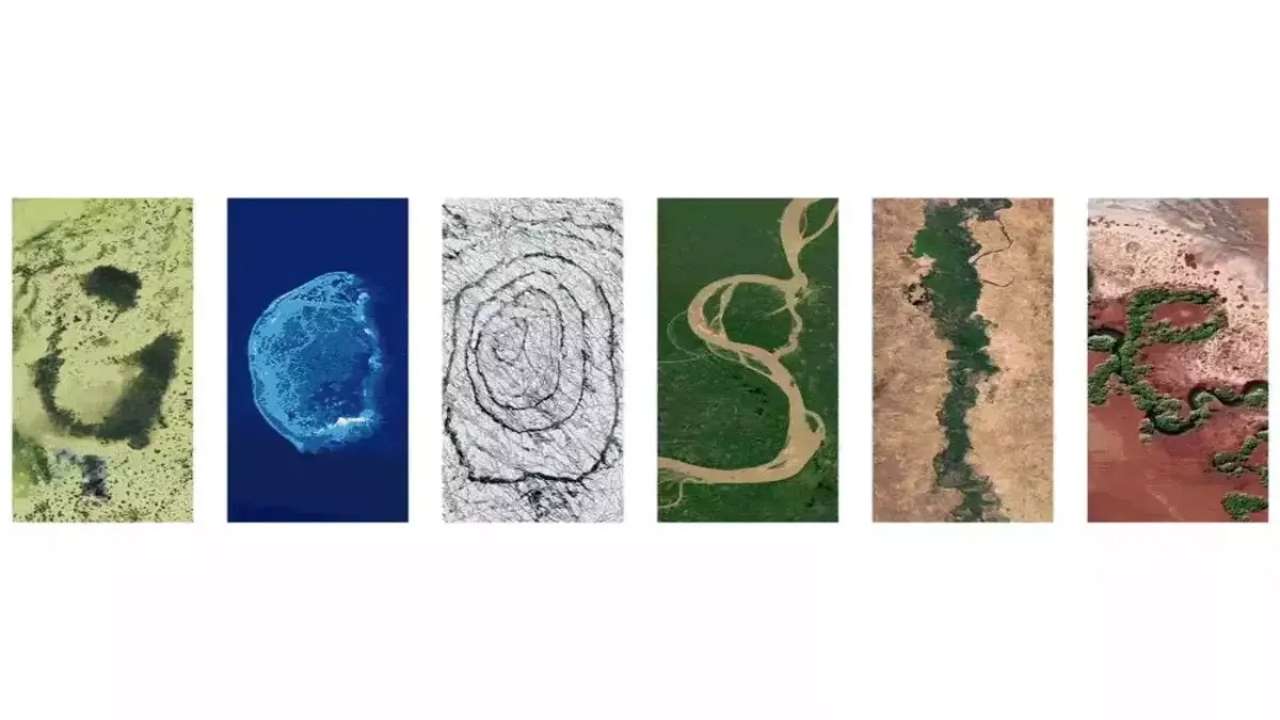
Google shared a doodle today to celebrate World Earth Day 2024, which showcased aerial photos of the planet’s biodiversity and natural beauty. Google reminded us of the importance of protecting planet earth for future generations with the help of this doodle.
The Google letters depict specific locations across the globe where people, communities, and governments work every day to help protect the planet’s natural beauty, biodiversity, and resources, according to the explanation of the annual Earth Day 2024 doodle on their website.
It said, these examples remind us that there’s much more to do to address the climate crisis and biodiversity loss, but also offer the promise of hope and optimism.
The islands of Turks and Caicos are represented by the letter “G.” The islands’ conservation efforts are concentrated on protecting important regions for biodiversity and addressing persistent environmental problems.
The largest reef in the southern Gulf of Mexico and a UNESCO biosphere reserve, Scorpion Reef National Park, is represented by the letter “O” in the Mexican flag.
The letter “O” features Iceland’s Vatnajokull National Park, which was designated as a national park in 2008 following decades of advocacy. The ecology within and surrounding the biggest glacier in Europe is safeguarded by this UNESCO World Heritage Site.
The letter “G” has the Jau National Park in Brazil on it. It is a UNESCO World Heritage Site and one of the biggest forest reserves in South America.
The Great Green Wall of Nigeria is represented by the letter “L,” and the Pilbara Islands Nature Reserves of Australia are represented by the letter “E.”
Meanwhile, Earth Day is a worldwide event that promotes protection of the environment every year. April 22 serves as a reminder of the importance of conservation efforts and sustainable practices to guarantee a healthier world and a brighter future.
The occasion inspires people across the world to come together and take action to protect the environment, strengthening our bonds with nature and promoting good change.
Latest world news
Bigg Boss 14 contestant Rahul Vaidya struggles walking in knee deep water, compares Dubai rains with Mumbai floods
Singer and TV personality Rahul Vaidya was recently stranded in the Dubai rains.

Rahul Vaidya, who was in Dubai ahead of his show which was scheduled to take place today, left the country due to heavy rains and reached Kolkata. The artist shared on social media his encounters in the UAE city, including challenges like walking through knee-deep water. Rahul provided an update regarding the heavy rainfall in Dubai on his Instagram profile.
The Bigg Boss 14 contestant revealed that he was in Kolkata and prepared to do an evening performance. Recalling the terrifying period he went through, Vaidya said there was a lot of confusion and panic in Dubai. The situation was similar to that when heavy floods hit Mumbai in 2005.
Vaiday also posted seval other images and videos of cars that were underwater and flooded roadways. The Bigg Boss 14 contestant, who shared his ordeal, claimed that even though it had just rained for two hours, the situation was dire.
In one of the video, which went viral he can be seen struggling in walking in knee-deep water. He can be also seen holding his sneakers in one hand and with other hand he was seen managing other things.
This is the result of the two hours of rain that it had, he can be heard saying in the video. Vidya also said he dosen’t believe Dubai is accustomed to a lot of rain. Everything had stopped working, he remarked.
After taking part in the first season of the singing reality show Indian Idol, Rahul Vaidya gained widespread recognition. In addition to Bigg Boss, he took part in Khatron Ke Khiladi 11.
Meanwhile, heavy rains that triggered flooding in the UAE and Bahrain, which left 18 people dead in Oman on Sunday and Monday, have paralyzed the financial hub of the Middle East, Dubai.
A lot of incoming flights were diverted from Dubai’s international airport because of the rain. At 7:26 p.m., the busiest airport in the world for foreign visitors stopped accepting new arrivals; a gradual resumption was announced for more than two hours later.
Images of planes navigating flooded tarmacs are making the rounds on social media.
According to pictures shared on social media, the flagship malls Dubai Mall and Mall of the Emirates both experienced heavy floods, while at least one Dubai Metro station had water up to the ankles.
There were several road collapses, severe flooding in residential areas, and numerous reports of leaks from windows, doors, and roofs.
Due to the unfavourable weather, schools around the United Arab Emirates were forced to close, and as more storms are predicted, the closures are anticipated to last until Wednesday. The government of Dubai allowed its staff to work remotely till this Wednesday.
Latest world news
Dubai sky turns green during storm in UAE, video goes viral
The UAE witnessed record-breaking rainfall on Tuesday and the National Centre of Meteorology recorded 254 mm of rainfall in less than 24 hrs in the Khatm Al Shakla area in Al Ain.

1 person was killed in UAE as it witnessed heavy rainfall on Tuesday, stranding commuters, flooding roads, disrupting trains and flights and resulting in water leakage from mall ceilings. The UAE witnessed record-breaking rainfall on Tuesday and the National Centre of Meteorology recorded 254 mm of rainfall in less than 24 hrs in the Khatm Al Shakla area in Al Ain. It is being said that the rainfall was the highest documented since the start of data collection in 1949.
The heavy rainfall in UAE came days after a similar situation in neighbouring Oman, where 13 people were killed in flash floods. Many parts of Oman saw torrential rains, which caused students to be trapped in buses and swept away motorists and trapped people in their homes.
Videos from Dubai circulating on social media showed widespread waterlogging on roads in Abu Dhabi, Dubai and other important cities. This left daily commuters in cars and other vehicles struggling to get back home. Dubai metro station too was seen flooded and closed.
One such video circulating on social media shows the aerial view of the city of Dubai from the top of a building. In the video the stormy winds are seen blowing over the city of Dubai. As the storm intensifies the Dubai sky turns green and ultimately gets covered by heavy rainfall. The video has gone viral on social media with more than 1.1 million views.
Another video showed water leakage from the ceilings of shopping malls, flooding the floors and destroying goods. A video which was shot in the famous Mall of the Emirates, showed pieces of ceiling falling as the rainwater gushed inside. Videos from many outlets of the Deira City Centre mall chain showed escalators being rendered unusable. Majid Al Futtaim, the company which owns the Mall of Emirates, said that the shopping complexes have been kept open and the customers are being sent away from the flooded areas.
-

 Entertainment24 hours ago
Entertainment24 hours agoBollywood stars Salman Khan, Alia Bhatt, Rekha, Sonakshi Sinha, Aditi Rao Hydari attend Sanjay Leela Bhansali’s Heeramandi premiere
-
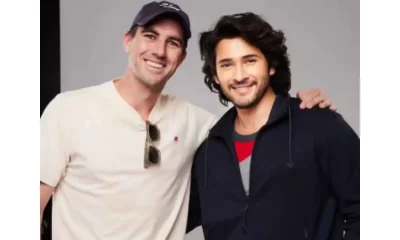
 Cricket news18 hours ago
Cricket news18 hours agoTelugu superstar Mahesh Babu meets SRH captain Pat Cummins, says it is an absolute honour
-
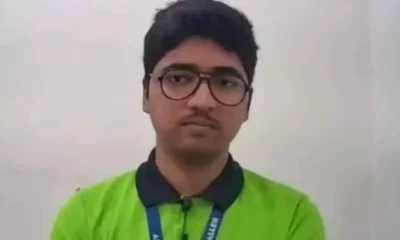
 Education23 hours ago
Education23 hours agoFarmer’s son Nilkrishna Gajare Nirmalkumar from Maharashtra scores 100 NTA score in IIT-JEE Mains 2024
-

 Entertainment21 hours ago
Entertainment21 hours agoAamir Khan to begin shooting in Delhi for Sitaare Zameen Par next month
-
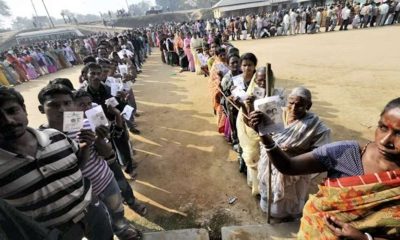
 2024 Lok Sabha Elections24 hours ago
2024 Lok Sabha Elections24 hours agoBihar: Election Commission extends voting timings for 4 Lok Sabha seats due to heatwave
-
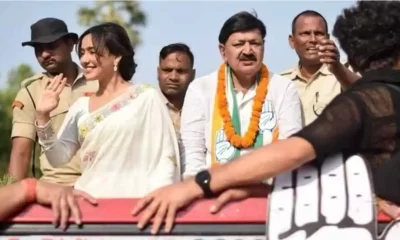
 2024 Lok Sabha Elections21 hours ago
2024 Lok Sabha Elections21 hours agoBollywood actor Neha Sharma campaigns for her father Ajit Sharma in Bhagalpur, Bihar
-

 Cricket news19 hours ago
Cricket news19 hours agoAB De Villiers criticizes RCB’s decision to let go Yuzvendra Chahal, says it was a hearbreaking moment
-
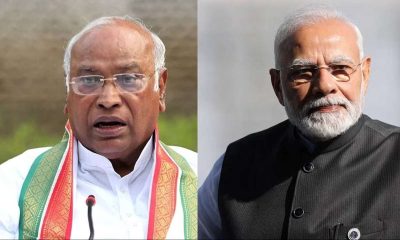
 2024 Lok Sabha Elections18 hours ago
2024 Lok Sabha Elections18 hours agoMallikarjun Kharge writes to PM Modi seeks time to explain Congress’s Nyay Patra

